- Yanguan’s well salt production began in the Zhou and Qin Dynasties, and the production and sales were booming continuously
- Lixian Yanguan is located in the West Hanshui River in the West Qinling Mountains. It flourished because of salt transportation and got its name from the salt
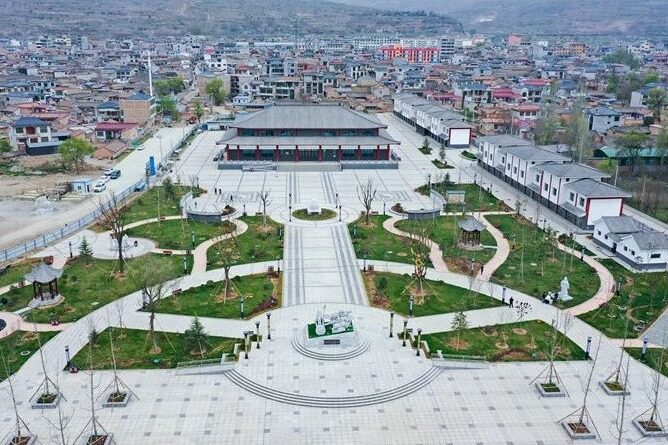
Yanguan in Lixian County is located in the West Han River of the West Qinling Mountains, and was born because of salt production in history. This is a famous commercial and trade town in Longshang soaked in salt culture. The salt culture here condenses some unique elements of folk wisdom and is extremely charming. Salt is an indispensable element to maintain the normal operation of the internal functions of the human body and other living organisms. China is a country rich in salt resources. Sea salt in the east, lake salt in the west and well salt in the Sichuan Basin are very rich. But looking at the large areas of Guanzhong and Longyou, except for the salt wells in Yanguan in Lixian County and Yanchuan in Zhangxian County, salt resources are relatively scarce. The strategic position of these two wells is self-evident.
The salt well in Yanguan Town is located outside the south gate of Yanguan Old City, in the courtyard of Yanshen Temple. In recent years, the Qin Fengni Xiyan unearthed in the suburbs of Xi'an has been identified by experts as evidence that the Qin State had salt officials here during the Warring States Period or the Qin Dynasty. Presumably, before the establishment of salt officials here, the salt industry here had a process of discovery, early development, and continuous improvement. Salt wells are actually brine springs. It can be imagined that salt springs seeped in ancient times, and there were several brine beaches of different sizes nearby. Because horses like to drink brine, herders can easily find salt springs. Over time, the salt spring must be dug deep to become a salt well.
Guangkai brine pool is an indispensable factor for the Qin people to become famous for herding horses here. Boiling water into salt is also an important strategic material for the Qin people to set up camp here and eventually unify the six countries in Dongtuguan. In the fourth year of Yuanshou in the Western Han Dynasty, when the Yantieguan was set up, because there were salt wells in the area, the Yanguan was set up to manage the salt. Over time, the official name was changed to a place name and is still in use today.
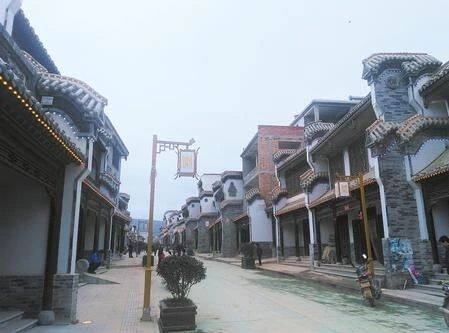
Yanguan Antique Street
Du Fu, a great poet of the Tang Dynasty, once lived in Qinzhou. On the way from Qinzhou to Tonggu (now Chengxian County, Gansu Province), he passed by the Yanguan of Jinli County and wrote a famous work reflecting the life of the salt people - "Salt Well". The Yanguan Salt Industry in the Song Dynasty had become quite large. In the Ming Dynasty, the production and sales of table salt were relatively stable, and the market for table salt was more popular, with an annual output of 131,500 catties of salt. During the Guangxu period of the Qing Dynasty, there were 250 salt households in the local area, with an annual production and sales of 230,000 jin of salt (Republic of China Edition "Li County Chronicles"). During the period of the Republic of China, the annual output of well salt was between 135,000 and 400,000 jin. After the founding of New China, Yanguan Salt Industry faced a new period of development. In 1952, Yanguan had 256 salt households, with annual production and sales of more than 800,000 jin of salt. Until the end of the 1970s, with the increase in the production cost of Yanguan Salt Industry, the cheap Hexi Ya salt gradually replaced the local well salt. The Yanguan Salt Industry, which lasted for more than 2,000 years, withered, leaving only the prosperous historical imprint .
In Yanguan, another advantageous resource that complements salt is horses. The watershed of the Western Han Dynasty has been the best area for raising horses since ancient times. The mules and horses raised around Yanguan have always been the war preparation materials of the country in the era of short weapons, and also the labor tools favored by various places in the era of agricultural economy. Horses drink brine and grow strong. The ancestors discovered the well salt resources here and started salt production. The transportation network formed by transporting salt, and the catering service of the posthouse provided the necessary conditions for the formation of the mule and horse trading market later. From the mid-to-late Qing Dynasty to the end of the last century, Yanguan was once a well-known mule and horse trading market, and has always played the role of a mule and horse distribution center in Northwest my country.
The magic pen made by well salt
Prehistoric humans have begun to master the skills of developing and utilizing salt. There are three early human salt-making technologies: one is to open up the salt veins close to the ground to make salt, the other is to use evaporation technology to make sea salt, and the third is to extract salt springs or underground brine for frying Salt. It is relatively simple to make salt from salt veins. The production of sea salt generally adopts the sun drying method, and its technological process is divided into four major processes: moisture collection, brine making, crystallization, and salt collection. Tide intake is to introduce seawater into the evaporation pool at high tide, then increase the salinity of brine through evaporation and concentrate it into saturated brine, continue to evaporate and precipitate salt crystals, and finally put the salt away into piles. The indigenous production of well salt is mainly divided into three steps: sinking wells, extracting brine and boiling salt. The natural brine is extracted by sinking wells, heated in a vessel to continuously evaporate the water, and finally crystallized into finished salt.
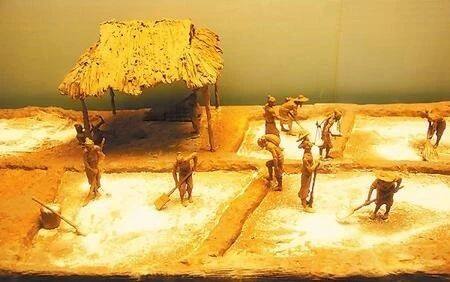
Salt pan model
The production process of Yanguanjing salt, which is extracted from salt spring brine and decocted salt, has been passed down from generation to generation, and the procedures are unique and complicated. The book "China's Salt Industry Summary" contains: Salt officials make salt, first scoop out salt water and sprinkle it on the clay, and then sprinkle salt water on it after drying. On the shelf, pour the salt water into each retort to let it slowly ooze out, then collect the oozing water and boil it to form salt. This process can be broken down into four steps: one is soil mixing. Pile the filter salt soil that has become black ooze from the last leaching and put it on the corner of the salt soil table, let it dry for a while, dig it out with a shovel, split it into small pieces, spread it out and dry it, break it with a plane, and use a milling machine Turn over the crisp, level it with a rake, and repeat it many times until the raw soil becomes finer and becomes reusable filter salt soil. The second is to irrigate with salt water. Use a large or small spoon to evenly sprinkle the salt water drawn from the salt well on the filter salt soil, and then pour it repeatedly after drying in the sun. After seven or eight days, the raw soil absorbs a large amount of salt and becomes mellow soil, which is moved back to the salt room for storage. The third is to filter salt. Pack the mellow soil into a bird's nest shape with bamboo baskets, and then arrange the packed baskets neatly on the slot board. The number of baskets varies. A pot of salt generally needs 30 to 40 pieces. Then slowly add well salt and brine to the basket, and wait for it to slowly seep out. Put a bucket under the trough to hold the filtered salt water. It will take about half a day. In a short time, the salt water in a row of baskets can be completely drenched. The fourth is to boil salt. Fill a pot with the leached salt water, burn it with firewood, boil the water on high fire first, then change to low heat, evaporate slowly, then add salt water, and turn to high heat again. Repeat this until the pot bubbles, add about one or two cornmeal, the water in the pot evaporates into a silt shape, and then the salt is analyzed, and it is stored in a bucket with a thick porcelain bowl.
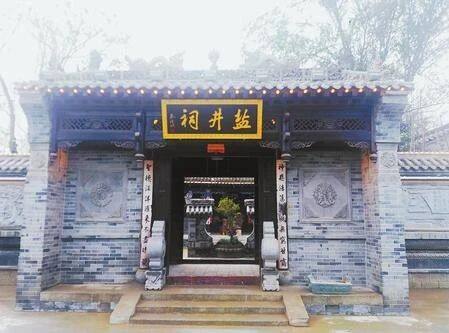
From the above-mentioned salt-making process, it is not difficult to see that the uniqueness of Yanguan’s well salt production technique lies in the intervention of soil, which is a procedure not found in well salt production in other places. There are two reasons for this: first, the salinity of brine in Yanguan is relatively low, and a process of naturally evaporating the brine to increase the salinity is required before a large amount of boiling. Salt is corrosive, and stone vessels are the best for evaporating brine. However, Yanguan belongs to the loess area and lacks stone materials. The pottery that can be produced locally has a small capacity and is easily broken. Metal vessels are easily corroded. The natural evaporation of brine The process is difficult to achieve with traditional methods. Second, if you directly boil water and boil salt, the local fuel resources are insufficient, unlike Zigong, Sichuan, which has abundant and cheap natural gas available. Therefore, the ancestors used local materials, selected local rocks and soils, and poured brine repeatedly to increase the salt content of the brine and reduce the cost of salt production. This is a great creation of the local working people. This method of using soil as a medium to save the investment cost of frying salt in the process of making well salt is unique except for salt officials.
Mystical Elements in Salt God Belief
Belief in gods is a kind of behavior that people pray to gods for protection to avoid disasters. Since people cannot live without salt, they need its personified product, the God of Salt. The belief in the salt god is synchronized with the development and utilization of salt by humans, and is an integral part of the folk salt culture.
Our country has a vast geography, and the salt gods worshiped by salt people in various places in history are different, including Su Shashi, Jiaoge, Guan Zhong, Zhang Daoling, Ge Hong, Lin Jun, Mei Ze, Zhan Dayu and more than 20 people. These salt gods are either heroes who discovered or produced salt, or gods who gave salt to humans, or they were the ancestor gods of the tribe or the ancestor gods worshiped by the salt industry because of their meritorious service in occupying the land of fish and salt.
Salt officials have a long-standing belief in the God of Salt. There is a salt well temple built outside the south gate of the old city of the town, covering an area of more than 600 square meters. It is composed of front, middle and back courtyards. . Yanjing Temple is an important landmark of Yanguan. The temple is dedicated to the God of Salt. Every year, a temple fair of the God of Salt is held here, which is highly valued by the local people. Editor/He Yuting
Comment
 Praise
Praise
 Collect
Collect
 Comment
Comment
 Search
Search



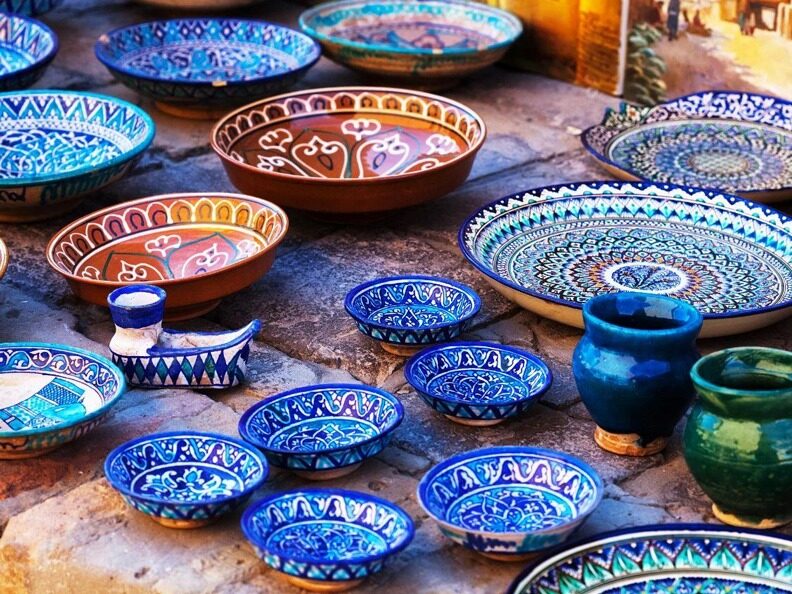
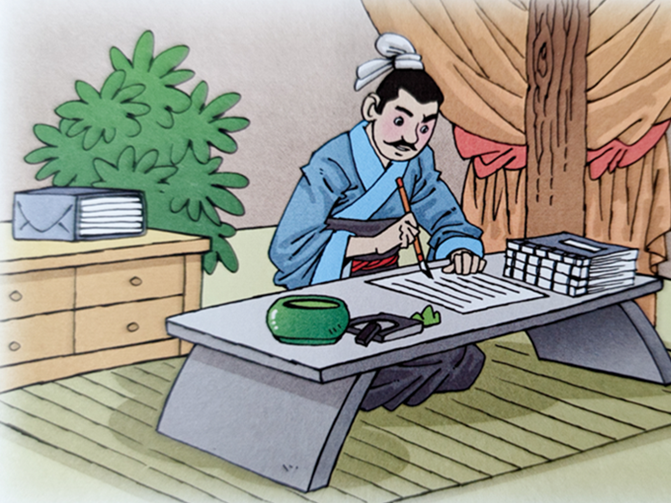
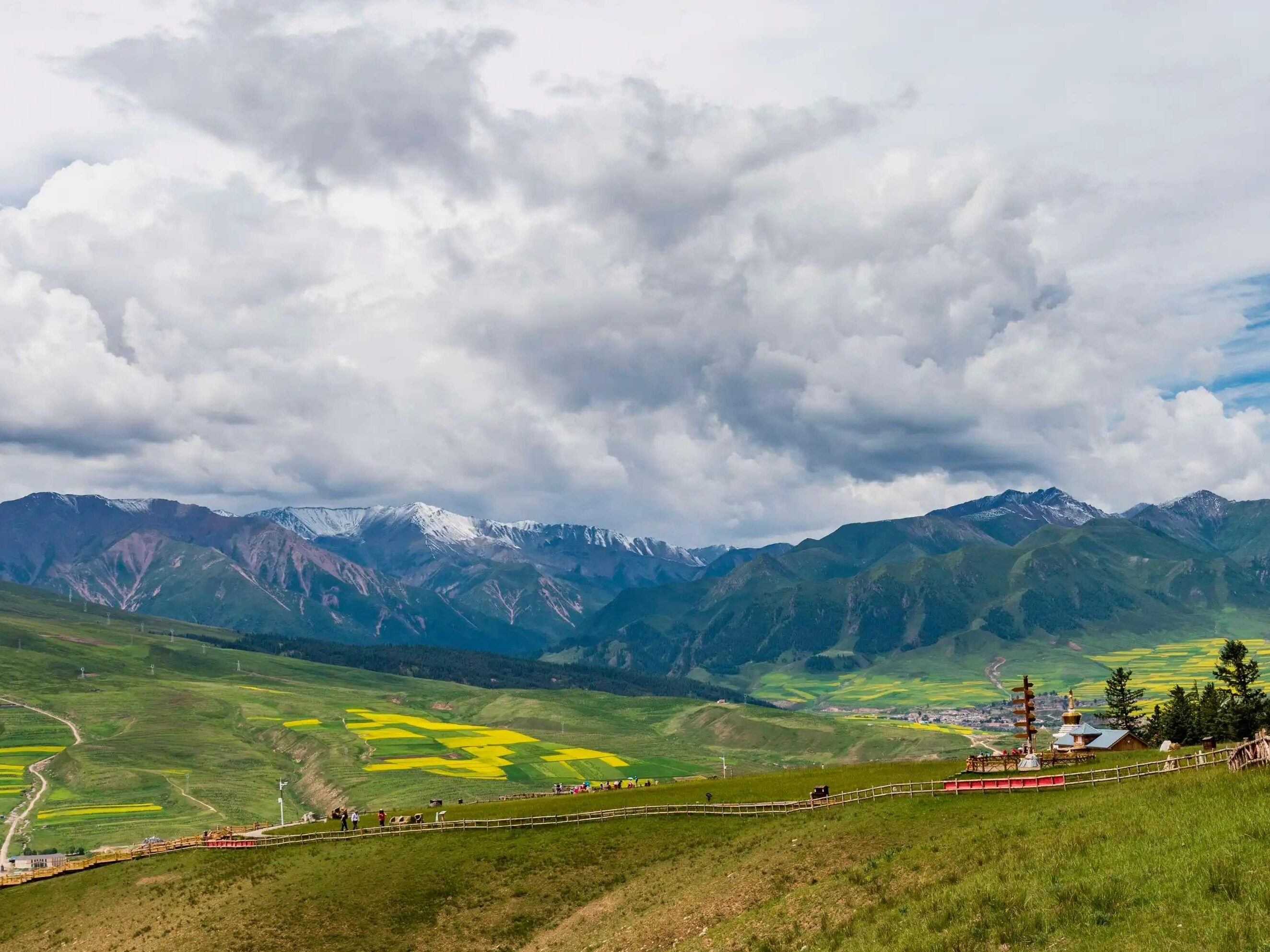








Write something~